Here is the example how you could call your azure function into the .net core API controller.
I have a simple azure function which return a name and email once its called. Let's see the below example:
public class InvokeAzureFunctionController : ApiController
{
// GET api/<controller>
public async System.Threading.Tasks.Task<IEnumerable<object>> GetAsync()
{
HttpClient _client = new HttpClient();
HttpRequestMessage newRequest = new HttpRequestMessage(HttpMethod.Get, "http://localhost:7071/api/FunctionForController");
HttpResponseMessage response = await _client.SendAsync(newRequest);
dynamic responseResutls = await response.Content.ReadAsAsync<dynamic>();
return responseResutls;
}
}
Note: Just replace your local host and put azure portal API URL
Test Function For Controller Invocation:
public static class FunctionForController
{
[FunctionName("FunctionForController")]
public static async Task<HttpResponseMessage> Run([HttpTrigger(AuthorizationLevel.Anonymous, "get", "post", Route = null)]HttpRequestMessage req, TraceWriter log)
{
log.Info("C# HTTP trigger function processed a request.");
// parse query parameter
string name = req.GetQueryNameValuePairs()
.FirstOrDefault(q => string.Compare(q.Key, "name", true) == 0)
.Value;
if (name == null)
{
// Get request body
dynamic data = await req.Content.ReadAsAsync<object>();
name = data?.name;
}
ContactInformation objContact = new ContactInformation();
objContact.Name = "From Azure Function";
objContact.Email = "fromazure@function.com";
return req.CreateResponse(HttpStatusCode.OK, objContact);
}
}
Simple ContactInformation Class I have Used:
public class ContactInformation
{
public string Name { get; set; }
public string Email { get; set; }
}
PostMan Test:
I have called the controller action from Post Man and its successfully return data from my local azure function through the local controller action. See the screen shot below:

Hope you understand. Just plug and play now.
